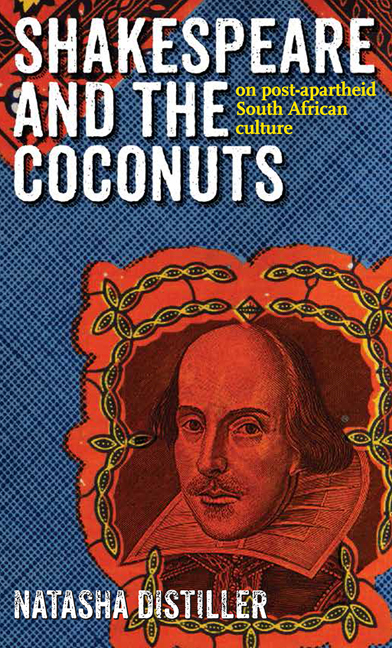Book contents
- Frontmatter
- Contents
- Acknowledgements
- Introduction
- Chapter 1 Shakespeare in English, English in South Africa
- Chapter 2 ‘Through Shakespeare's Africa’: ‘Terror and murder’?
- Chapter 3 Tony's Will: Titus Andronicus in South Africa, 1995
- Chapter 4 Begging the questions: Producing Shakespeare for post-apartheid South African schools
- Chapter 5 English and the African Renaissance
- Chapter 6 Shakespeare and the coconuts
- Endnotes
- Bibliography
- Index
Chapter 4 - Begging the questions: Producing Shakespeare for post-apartheid South African schools
Published online by Cambridge University Press: 21 April 2018
- Frontmatter
- Contents
- Acknowledgements
- Introduction
- Chapter 1 Shakespeare in English, English in South Africa
- Chapter 2 ‘Through Shakespeare's Africa’: ‘Terror and murder’?
- Chapter 3 Tony's Will: Titus Andronicus in South Africa, 1995
- Chapter 4 Begging the questions: Producing Shakespeare for post-apartheid South African schools
- Chapter 5 English and the African Renaissance
- Chapter 6 Shakespeare and the coconuts
- Endnotes
- Bibliography
- Index
Summary
Andile Mngxitama's City Press article ‘Coconut Kids Have Lost Touch with Their Roots’ was mentioned in the Introduction. It was written in 2007, presumably at least partly in response to the publication of Matlwa's Coconut novel in the same year. As we have seen, Mngxitama characterises the young black elite of post-apartheid South Africa in the usual reductive terms of the coconut: ‘One of the peculiar … developments of post-apartheid South Africa has been the rapid emergence of influential young people who are neither black nor white.’ That he finds it ‘peculiar’ that access to privilege should equal the creation of what he calls ‘an assimilated elite’ suggests that Mngxitama, like others who understand coconuttiness in this wholly binary and negative way, does not know the history of education in the country. Mngxitama deplores the ways these children are educated into being ‘nothing but agents of whiteness’, who ‘will in the end denounce their own parents as too black and backward’. They cover their ‘white souls’, he says, with commodified markers of superficial blackness, like ‘Biko t-shirt[s], beads and seshweshwe tops’. The egregious whiteness of these coconut kids is exemplified, of course, in the English that they ‘spit … through the nose’, encouraged by parents who want them to succeed in a world where only English will get you anywhere. Mngxitama is critical of young people who ‘don't want to be burdened by history’, worrying that ‘[w]ithout an appreciation of how history defines the present, one invariably ends up blaming the poor for their predicament’. He is most concerned by the intrinsic racism he sees as part and parcel of coconuttiness, and the reduction of all political values to commercial ones.
The complaints that young South Africans are tired of the burden of the past, and that neo-liberal globalised values are problematic for our emerging society, are cogent concerns, although the causes and solutions are a little more complex than blaming English and a simplified version of rich, racist ‘whiteness’. What is notable in Mngxitama's article for the purposes of this book is the noting, as if new, as if uniquely post-apartheid, of a social situation which goes back to the founding of the country. I'm not suggesting that there are no differences between colonial and post-apartheid South Africa.
- Type
- Chapter
- Information
- Shakespeare and the Coconutson post-apartheid South African culture, pp. 97 - 124Publisher: Wits University PressPrint publication year: 2012



